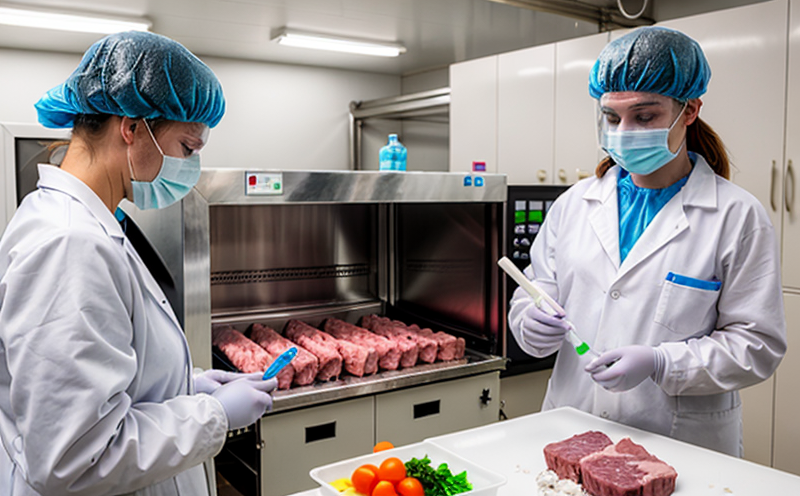ASTM E2998 Validation of Microbiological Methods in Dairy & Meat
The validation process specified by ASTM E2998 is a critical step in ensuring that microbiological methods used in the dairy and meat industries meet stringent quality standards. This service involves rigorous testing to confirm the accuracy, precision, and reliability of analytical procedures for detecting microorganisms in these sectors. The primary goal is to provide laboratories with validated methods that are both scientifically sound and compliant with international regulatory requirements.
The ASTM E2998 standard provides a framework for validating microbiological methods used in the dairy industry, including raw milk, cheese, yogurt, and other dairy products. This includes testing for pathogens like Listeria monocytogenes, E. coli O157:H7, and others that can pose significant health risks if not properly controlled. For meat microbiology validation, the process encompasses a wide range of species such as beef, pork, chicken, and others.
Microbiological methods validated under ASTM E2998 are essential for ensuring product safety, compliance with regulatory standards, and maintaining consumer trust. This service is particularly important in industries where food safety is paramount, and where even small errors can lead to significant public health concerns or financial losses.
The validation process typically involves several stages:
- Method selection: Choosing the appropriate method based on the specific needs of the dairy or meat industry.
- Method description: Providing a detailed account of how the method will be implemented, including specimen preparation and expected results.
- Calibration and maintenance: Ensuring that all equipment is properly calibrated and maintained throughout the validation process to avoid errors in measurement.
- Data analysis: Analyzing data collected during the validation process to ensure it meets specified criteria for accuracy and precision.
The ASTM E2998 standard provides a structured approach to method validation, which includes the following:
- Statistical analysis of results
- Evaluation of method performance characteristics
- Inter-laboratory testing
This process ensures that any new or modified microbiological methods are thoroughly tested and validated before being implemented in the industry. By adhering to ASTM E2998, laboratories can provide reliable and consistent results that meet international standards.
The benefits of this service extend beyond ensuring compliance with regulatory requirements. Validated methods also help improve product quality, reduce the risk of contamination, and enhance overall food safety. Additionally, validated methods contribute to better resource management by enabling more efficient use of laboratory resources.
Benefits
The ASTM E2998 validation process offers numerous benefits for laboratories in the dairy and meat industries:
- Enhanced Compliance: Ensures that methods are compliant with international standards, which is essential for regulatory compliance.
- Improved Product Quality: By validating methods, laboratories can ensure consistent and high-quality results, leading to improved product quality.
- Increased Efficiency: Validated methods reduce the likelihood of errors, allowing laboratories to operate more efficiently.
- Better Resource Management: Efficiently utilizing laboratory resources through validated methods helps in cost-effective operations.
In addition to these direct benefits, validated methods also contribute to better resource management by enabling more efficient use of laboratory resources. This is particularly important in industries where the stakes are high and mistakes can have significant financial or reputational consequences.
Customer Impact and Satisfaction
The implementation of ASTM E2998 validation significantly impacts customers, enhancing their satisfaction levels:
- Trust in Results: Customers gain confidence knowing that the methods used are scientifically sound and compliant with international standards.
- Increased Safety: Validated methods contribute to safer food products, which is crucial for maintaining customer trust.
- Better Decision-Making: With validated results, customers can make informed decisions based on reliable data.
- Competitive Edge: By demonstrating a commitment to quality and compliance, laboratories can gain a competitive edge in the market.
Customer satisfaction is paramount, and by adhering to ASTM E2998 standards, laboratories can ensure that their methods are reliable and accurate. This not only enhances customer confidence but also contributes to long-term business relationships.
Competitive Advantage and Market Impact
The implementation of ASTM E2998 validation provides significant competitive advantages and market impacts:
- Enhanced Reputation: Laboratories that adhere to ASTM E2998 standards are seen as leaders in quality and compliance, enhancing their reputation.
- Better Customer Relationships: By providing reliable results, laboratories can build stronger relationships with customers, leading to increased loyalty and repeat business.
- Innovation Opportunities: Validated methods often lead to new innovations and improvements within the industry.
- Regulatory Compliance: Adhering to international standards ensures that laboratories remain compliant with regulatory requirements, avoiding potential fines or sanctions.
The market impact of ASTM E2998 validation is profound. Laboratories that adopt these practices are better positioned to meet the demands of a competitive market and can anticipate future trends in food safety and quality assurance.





